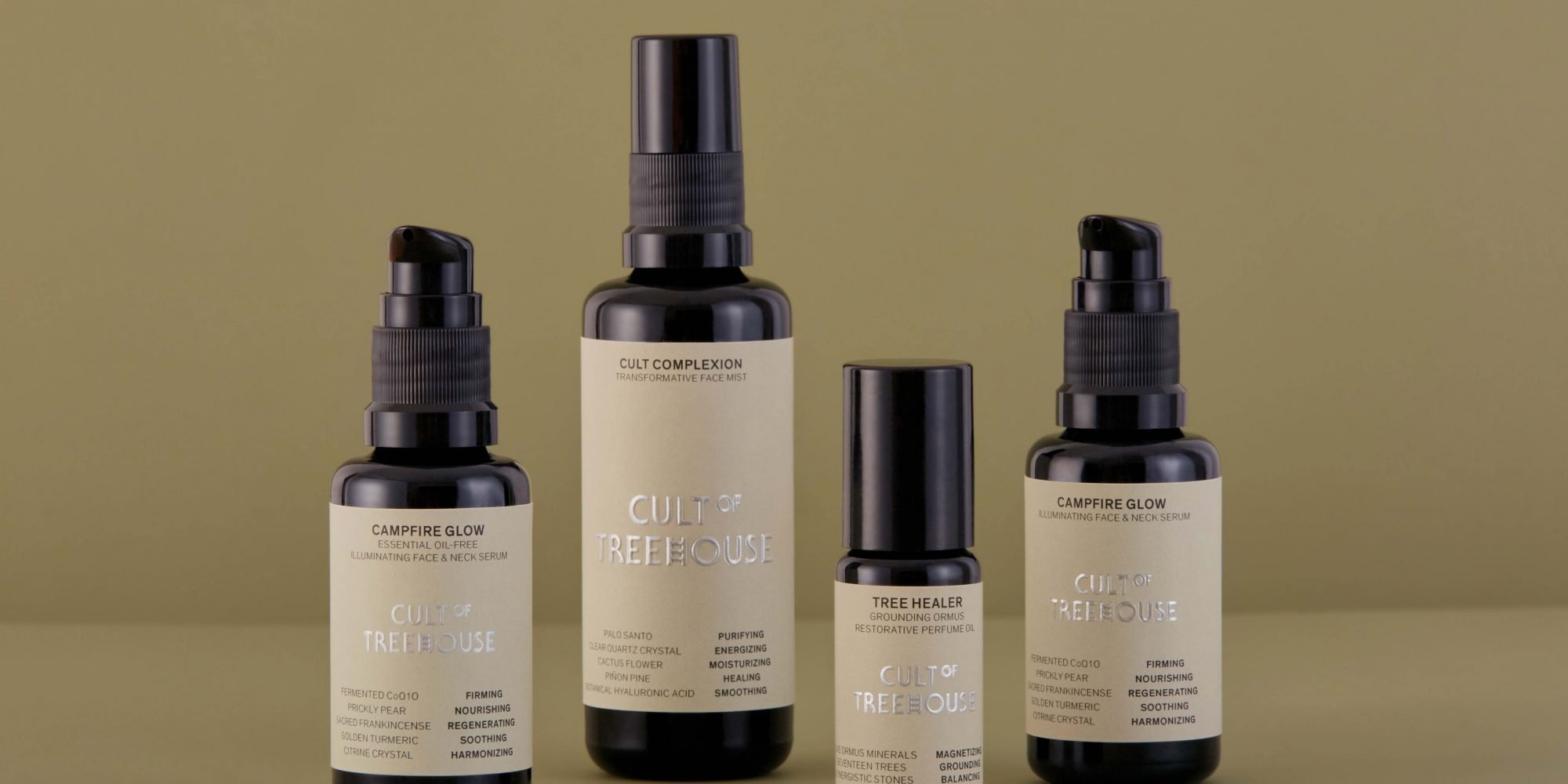
Small-Batch Beauty Brand Cult Of Treehouse Puts Good Vibrations In Its Bottles
There’s nostalgia brewing for the 1960s and 1970s before natural skincare brands flooded huge chains and became coveted by investors seeking big returns. Harkening back to the hippie heyday, Kari Molvar writes in T The New York Times Magazine that it was a moment when “wellness didn’t feel like a marketing concept” and “do-it-all formulas made with uncomplicated plant-derived ingredients” flourished.
Amid the longing for a simpler time comes Cult of Treehouse, a brand with throwback sensibilities that strips away the artifice of beauty merchandise as it steers clear of synthetic ingredients. Handmade in small batches at founder Amelia Rynkowska’s home in Topanga, Calif., with a maximum of 50 products per batch, its four items contain extracts created from unrefined botanical ingredients in harmony with the cycle of the moon and heated by the sun.
“A lot of well-crafted, well-sourced ingredients go into every product,” says Rynkowska, a model and writer in addition to being a self-taught cosmetic formulator. “My whole premise is less is more, and you’re meant to use three or four products rather than a million different products. Each product has three to five uses, and they all work together as a set. They are all multifaceted hero products that focus on high-vibrational ingredients.”
The hero product among the hero products is Campfire Glow, a face and neck oil serum with prickly pear seed, cucumber seed, apricot kernel, red raspberry seed, jojoba seed and olive fruit oils. Its formula also has a citrine crystal, and the tree ingredients hiba wood, bisabolol, Hawaiian sandalwood and frankincense. Campfire Glow is priced at $110 for a 1.-oz. size and available in an essential oil-free variety.
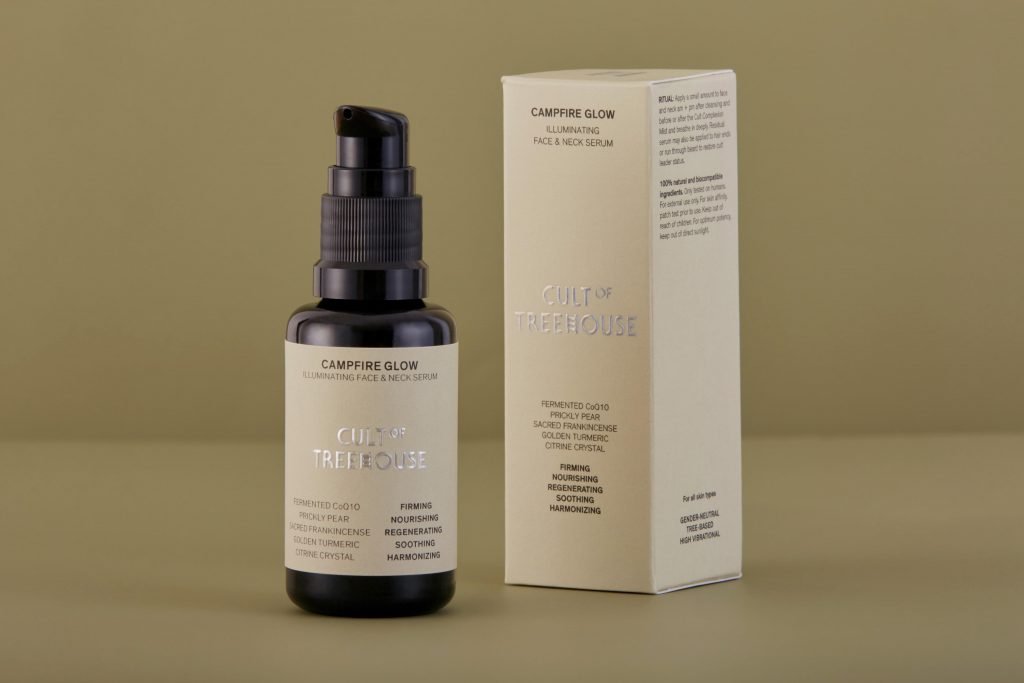
“I wanted to incorporate the trees as a grounding force. All of the products are tree-based. They are all gender-neutral. They are to be shared,” says Rynkowska. “Campfire Glow is the go-to moisturizer. When you apply it, you get a sense of grounding, calm and balance. The ingredients have a mind effect because of their good vibrations.” Fresh, organic ingredients oscillate at greater frequencies than heavily processed ingredients, indicating superior nutritional benefits.
Cult of Treehouse’s face mist Cult Complexion has at least five functions. It’s a clarifying toner, light moisturizer, complexion booster, and protectant against pollution and undesired bacteria. The product’s tree ingredients are piñon pine, aspen, and willow and birch barks. Other ingredients include neroli, glycerin, colloidal silver, yerba santa and aloe vera. Cult Complexion is priced at $70 for a 1.7-oz. bottle.
“My whole premise is less is more, and you’re meant to use three or four products rather than a million different products.”
“It was the first product I developed. I wanted a skin-soothing, spot-minimizing treatment. There’s a clear quartz in each bottle that acts as a blender and centers the product,” says Rynkowska, acknowledging the mist requires customer education. “It’s something I have to talk more about and explain. People struggle with spraying their faces. It’s a lifestyle choice with a spray.”
The final Cult of Treehouse product currently is the perfume oil Tree Healer. Priced at $94 for a .34-oz. roll-on, Rynkowska details the oil “has 17 trees in it with a base that dissolves unfriendly electronic fields. It makes you feel calm, light and settled.” Cult of Treehouse’s next product is expected to be a cleansing and body oil.
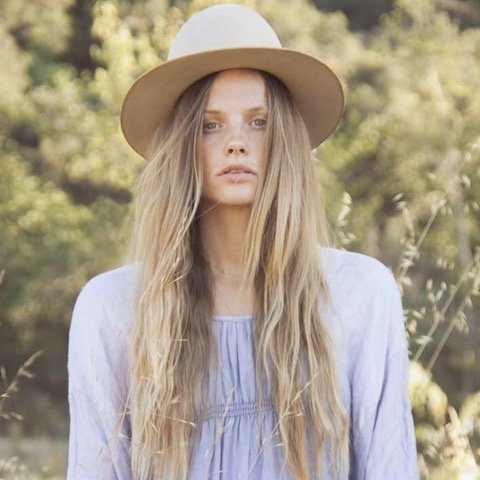
Rynkowska, 33, moved from London to California, specifically Laurel Canyon, in 2015. Then in her late 20s, she was undergoing mental and physical changes. “I was learning about myself,” says Rynkowska. “The physical aspects of skin irritations and acne that arose from my mental state really triggered me to look deep into figuring out how I could self-heal.” She’d already been whipping up plant-driven balms and macerations for routine conditions, and decided to explore plant ingredients further to tackle her skin issues.
“When I was formulating, it was whole plant actives that I wanted to focus on. It was more about trial and error for me to address what I was seeing personally,” says Rynkowska. “It was all about retaining the potency of the whole plant ingredients by maintaining their structure. That was a turning point for me. I really saw how the plants reacted with the oils in the extracts, and how gentle they were and how it was almost like a dance. By being gentle, and having a ritual and appreciating the plants in their most potent form, that had a positive impact on me and my skin. I felt a real lift through the process. I noticed my skin and my mind started to improve.”
“By being gentle, and having a ritual and appreciating the plants in their most potent form, that had a positive impact on me and my skin. I felt a real lift through the process. I noticed my skin and my mind started to improve.”
Rynkowska returned to London in 2017 and transformed her personal endeavor into a professional business. Cult of Treehouse, named for the Laurel Canyon treehouse where it was born, began to sell online, and at boutiques and yoga studios. A year later, Rynkowska was back in California, and had to reimagine her brand to suit the market in the United States and find local suppliers to support it. In June, she completed the overhaul and introduced Cult of Treehouse to American shoppers.
The brand’s products are packaged in dark Miron glass to shield the formulas inside from ultraviolet rays. Paper labeling on the packaging weathers as customers deplete the formulas. “It’s quite reflective of a natural product,” says Rynkowska. “It’s not wiped clean and clinical. It has fingerprints, and it takes on a personality.” She continues that Cult of Treehouse’s ladder logo “represents a higher power, climbing up to social consciousness and respect for nature.”
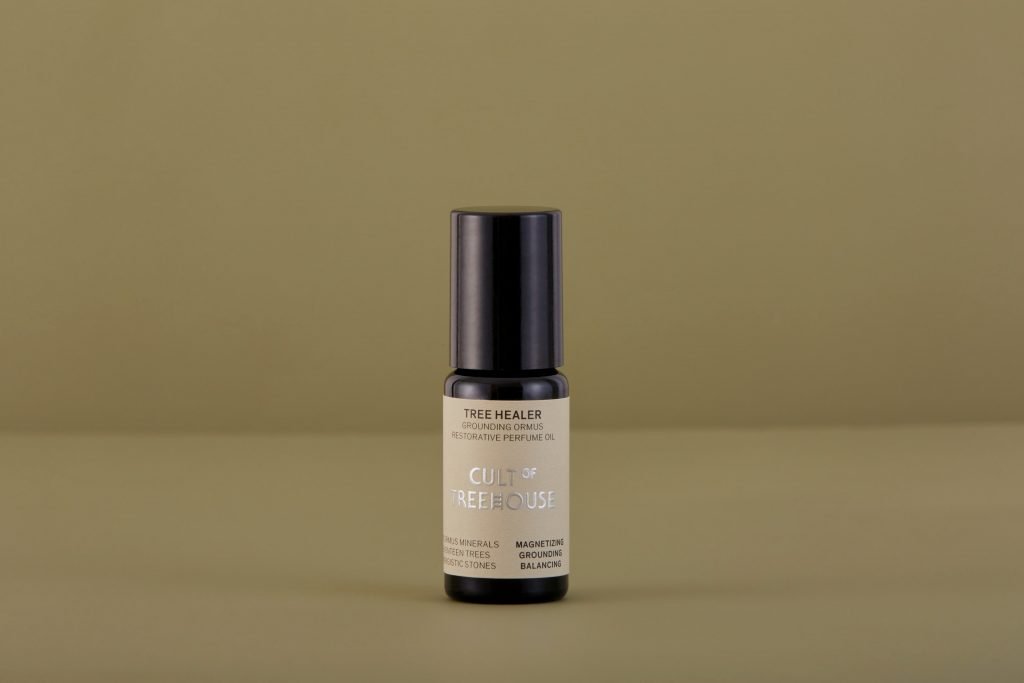
Rynkowska describes Cult of Treehouse’s core consumers as extremely careful about what they put on their skin, and interested in the “transparency of the company, where ingredients are sourced, how they are sourced, and how the products are made.” To reach them, she’s concentrating on placing the brand in a select few retailers. CAP Beauty and Credo are the sorts of retailers she’s targeting.
“I want to focus on three or four initially. Building relationships is important, and I want to understand the people that buy Cult of Treehouse and connect with them personally at green beauty stores, through the website or social media, and not roll out to wholesale at 100 different shops,” says Rynkowska. “It’s a slow process that will grow a stronger foundation.”

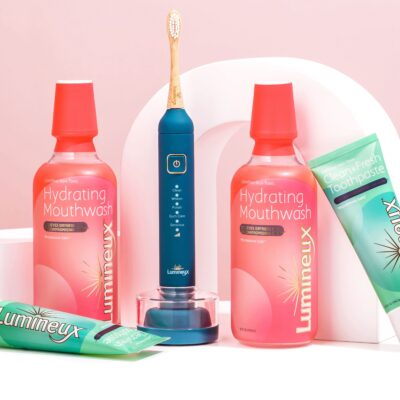
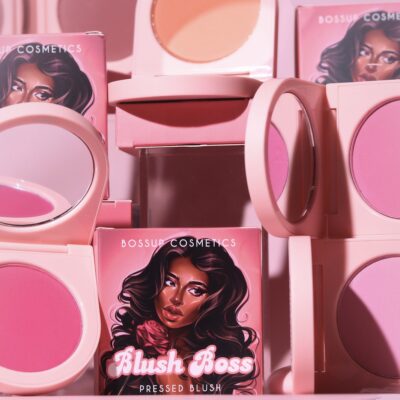
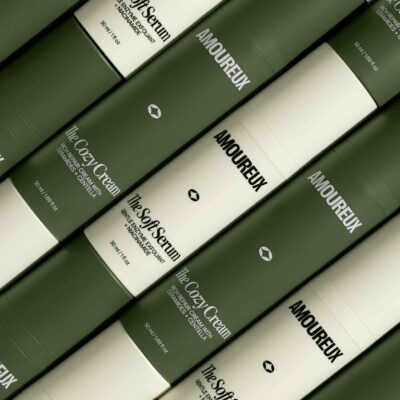

Leave a Reply
You must be logged in to post a comment.